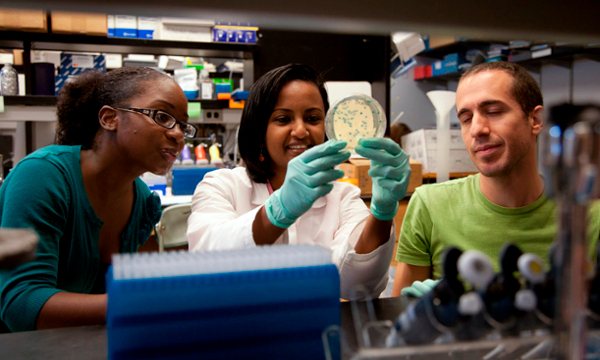Program Curriculum
The graduate experience in MMG begins with an introduction to the faculty and their research through a series of short talks known as the Introduction to Faculty Research series. Students then choose the first of three research rotations, which are designed to provide exposure to different areas and to varied techniques, and to enable the student to choose a laboratory for thesis research. These rotations proceed one at a time beginning early in the fall semester and concluding late in the spring semester. Typically, students affiliate with a home lab and mentor by the end of the spring semester of their first year.
In addition to laboratory rotations, students also complete the core courses below.
IBS 590: Becoming a Successful Scientist – Dr. Shonna McBride and Dr. Christopher LaRock
The goal of the course is to provide a basic foundation for all students so that they can better manage their graduate and overall scientific careers. There are four sections in the proposed course: 1) Managing Your Research; 2) Scientific Writing; 3) About Networking, Mentoring, and Mentors, and 4) Career Planning. These major topics are examined through lecture, discussion and projects presented in-class.IBS 504: Introduction to Prokaryotic Genetics - Dr. Philip Rather and Dr. Marcin Grabowicz
This is an introductory course in bacterial genetics designed to help students transition between large lecture courses and independent creative scientific thought. It also emphasizes oral communication. In the first third of the course, students are introduced to the basic terms and concepts in molecular genetics of bacteria and their viruses, including the mechanisms of genetic exchange and regulation of gene expression. The following segments of the course are devoted to reading and interpreting original papers in the field, both classical and contemporary. In discussion format, the students are encouraged to question conclusions in the papers and to design experiments to test "facts". Small sessions (voluntary) explain and discuss techniques in molecular biology and genetics applied to bacteria.IBS 513: Graduate Virology - Dr. David Steinhauer and Dr. Anice Lowen
The graduate virology course is designed to provide a strong background in the basic concepts involving viral replication, pathogenesis, and immunity. This is an interactive course in which several MMG and IMP faculty members are active participants. The first half of the course focuses on concepts that apply to viruses in general, and includes virus structure, host cell entry, RNA virus transcription and replication, DNA virus transcription and replication, Retroviruses and retroviral integration, processing and translation of viral RNAs, virus assembly and exit, chronic infections, viral pathogenesis, viral immunity, and immune evasion. The second half of the course concentrates on specific virus families, emphasizing human pathogens. In this half of the course, faculty members generally lecture on the viruses that their individual research programs are focused on. In addition to the Course Directors, guest lecturers from Emory and the CDC also participate.MMG 792r: Colloquium - MMG Program Faculty
This course instructs first and second year MMG students in the organization and presentation of research endeavors. Presentations of journal articles and personal research in progress are evaluated by both attending students and the faculty organizers.MMG 790r: Advanced Graduate Seminar
The seminar consists of presentation and critical evaluation of scientific material which can be obtained from a variety of sources including contemporary scientific literature. The course is designed to teach students how to analyze and interpret data, and importantly, to prepare and deliver oral presentations. After a student advances to candidacy, he or she may elect to take this course on a satisfactory/ unsatisfactory basis. Advanced students will, in general, present material relevant to his/her thesis project.MMG 597r: Lab Rotations - MMG Program Faculty
The Jones Program in Ethics (JPE) is a comprehensive program to educate doctoral students in all disciplines in the ethical pursuit of scholarly research. Training will take place both within interdisciplinary forums and also within the student’s graduate program. There are three elements to the program:
- JPE600,a one-day core course in scholarly integrity, supported by the Laney Graduate School in collaboration with the Emory Center for Ethics, will be required of all incoming graduate students.
- Program-based training in ethics and the responsible conduct of research takes place within existing courses. Additionally, MMG and Immunology and Molecular Pathogenesis (IMP) students will attend faculty-led ethics seminars arranged by the MMG and IMP Directors. Six seminars will be presented in the fall of each year. For the 2020 academic year, the programmatic ethics seminars will take place according to the schedule announced by the Program Administrator. All first-year students are required to attend. This initial series is required for Candidacy eligibility. All fifth-year students are required to attend post-candidacy. Second and sixth year students must attend any lectures they missed in the previous year.
- Students must attend a minimum of four JPE 610 topical public workshops, training sessions, or lectures offered by the graduate school before they graduate. These are not required to reach Candidacy, but students are encouraged to attend them early in their graduate school career. These are announced on the LGS listserv and will appear on the student’s transcript as a JPE 610 course.
The following courses (or their equivalents) are required of all students in the Microbiology and Molecular Genetics Program:
JPE 600| COURSE # | COURSE TITLE | CREDITS |
|---|---|---|
IBS 504 | Introduction to Prokaryotic Genetics | 6 |
*IBS 590 | Becoming a Successful Scientist | 3 |
MMG 590r | Advanced Graduate Seminar | 1 |
MMG 597r | Laboratory Rotations | 1 |
MMG 792r | Colloquium in Microbiology | 1 |
JPE 600 | Jones Program in Ethics | 0 |
| COURSE # | COURSE TITLE | CREDITS |
|---|---|---|
IBS 513 | Virology | 5 |
MMG 590r | Advanced Graduate Seminar | 1 |
MMG 792r | Colloquium in Microbiology | 1 |
MMG 597r | Laboratory Rotations | 2 |
| COURSE # | COURSE TITLE | CREDITS |
|---|---|---|
MMG 790r | Advanced Graduate Seminar | 1 |
MMG 792r | Colloquium in Microbiology | 1 |
IBS 522r | Hypothesis Design & Scientific Writing | 4 |
IBS 519r | Statistical Rigor, Reproducibility, and Experimental Design for Biomedical Data Analysis | 3 |
IBS 699r | Advanced Graduate Research | 1 |
TATTO 600 | Teaching Graduate School Workshop | 1 |
TATTO 605 | Teaching Assistantship | 2 |
| COURSE # | COURSE TITLE | CREDITS |
|---|---|---|
MMG 790r | Advanced Graduate Seminar | 1 |
MMG 792r | Colloquium in Microbiology | 1 |
IBS 699r | Advanced Graduate Research | credit hours vary |
XX | An Elective from the Spring List | credit hours vary |
Many MMG students take advantage of courses offered in the LGS public health sciences graduate programs such as Epidemiology and Biostatistics. There are also opportunities to take elective courses at Georgia Tech. For more information, contact the DGS or the Program Administrator. Please note that any courses taken outside of GDBBS must be approved by the course instructor and the program DGS before a student can enroll. Students must also discuss elective courses with their advisor to ensure the course will benefit their research and training trajectory.
| COURSE # | COURSE TITLE | CREDITS |
|---|---|---|
| IBS 515r | Current Topics in Molecular Genetics | 2 |
| IBS 538 | Statistical Design and Analysis of Experiments | 4 |
| IBS 539 | Population Dynamics and Community Ecology of the Microbiome | 3 |
| IBS 560 | Model Genetic Systems | 4 |
| IBS 568 | Principles of Anti-infectives | 4 |
| IBS 725 | Prokaryotic Gene Expression | 6 |
| IBS 727 | Genetics of Bacterial Pathogenicity | 6 |
| IBS 742 | Regulation of Cell Growth | 6 |
| IBS 777r | Annual Reviews of Immunology | 2 |
| MMG 797r | Directed Study | Variable |





